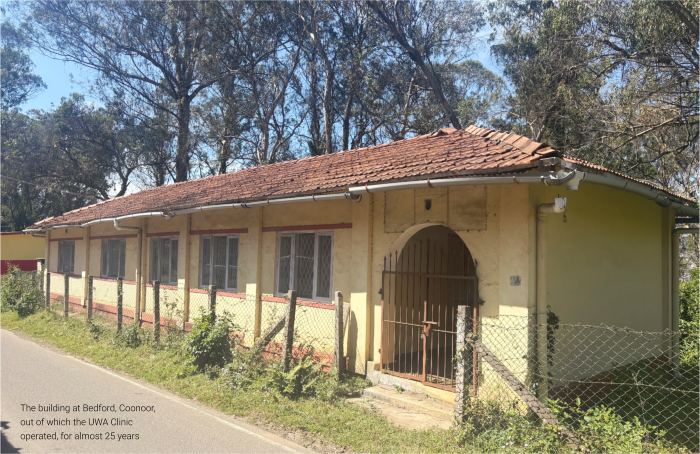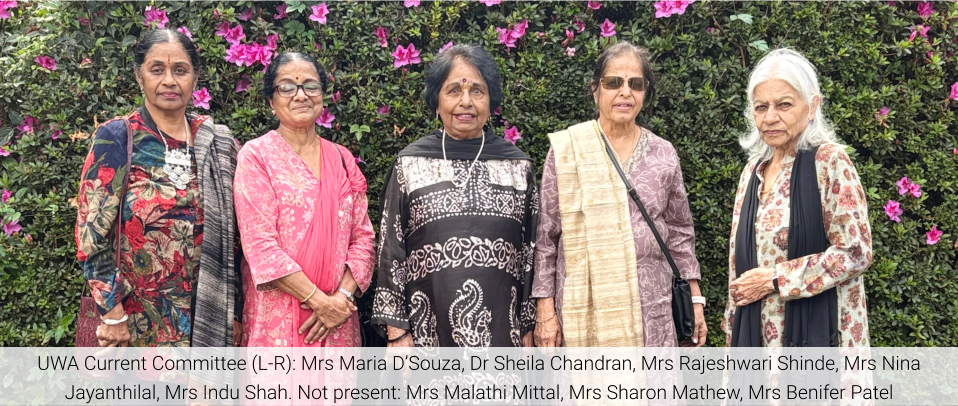Women for Women

Our sponsor this issue - UWA - an organisation that has served women for close to six decade
The University Women’s Association, started in 1919, is an organisation headquartered in Geneva, Switzerland, which aims to empower women and girls. It was started after the First World War; one of its goals was the fostering of peace by bringing together women from across the world. This remarkable organisation spread wide and far, and eventually made it to our very own Coonoor.
The idea to start a branch of the UWA in Coonoor was proposed by a Mrs Joseph, and kicked off in the year 1964, with only ten members.

Clinical Trial
During the initial meetings and discussions the UWA had, over a period of two years, the idea formed to set up a free clinic to provide quality healthcare to the underprivileged - already being run informally by Dr Belheart, a resident doctor in Coonoor at the time. In 1976, the clinic officially became a UWA project, and initially operated out of the All Saint’s Parish Hall. The clinic was unique, because it was the first one in the entire district to provide virtually free healthcare, charging just twenty-five paise from each patient for registration. However, if a patient was genuinely unable to afford even that much, they were were still given the necessary care.
In 1978, Siloo Manekshaw, the indomitable, straight-talking wife of the legendary Field Marshal Sam Manekshaw, took over as President and it was she who decided, in 1991, that the organisation needed its own premises. The committee members decided the best thing would be to acquire a piece of government land on which they could construct a building and carry out operations.
Enter Rajeshwari Shinde in 1983, an energetic woman, whose husband, the eminent Dr Shinde, was posted as medical specialist at the Military Hospital, Wellington. Mrs Shinde was a dancer, who also loved dramatics and thrived on getting involved in community activities. Siloo Manekshaw saw her potential and inducted her into the organisation as fast as you could say the word ‘clinic’, and appointed her as Secretary.

Letters of appeal and calls for donations were sent out for the building of the clinic. The first letter was sent to the Collector of the time, N Athimoolam, and although the reply was extremely favourable, it was clear that further permissions would be needed from Chennai, and this would be a time-consuming task. Rajeshwari Shinde, undaunted, went to Chennai and managed to get a meeting with the Director of the municipal administration. She explained the state of healthcare for the underprivileged in the Nilgiris at the time (back in the 80s), why the UWA clinic was the need of the hour, and there was an urgent necessity for their own premises. Despite verbal agreement, it took some effort before the approval finally came.
In the meantime, the number of patients coming to the clinic, which operated three times a week, had significantly increased, because of the excellent care provided by the doctors and volunteers. “All of us had to give voluntary service,” emphasises Mrs Shinde. “Not a penny was charged by the doctors and volunteers who came in.”
The government finally decided to give the UWA a piece of Poramboke land near Bedford, (a piece of land owned by the government that was unused and could be utilised by the public for worthy causes.)
Fundraisers
Once the land issue was settled, Mrs Shinde, along with Siloo Manekshaw and Sudha Parikh, a founding member of the UWA, Coonoor, took up the gruelling task of finding donors for the building. They sometimes had to go to Coimbatore to persuade textile kings such as PSR Silks and Mahaveers to make donations to the cause. They also approached wealthy and affluent members of local society to contribute towards this project. Field Marshal Manekshaw was instrumental in getting the bulk of the donations, not only for the construction of the building, but also for years following, from large government conglomerates such as Air India. And so in 1994, the clinic moved from the Parish Hall to its own premises. Mrs Shinde fondly gazes at photos taken on the day of the inauguration of the building and recalls that along with a Christian hymn being sung, phrases from the Bhagavad Gita, the Zend Avesta and the Bible were read out. “It was a very inclusive initiative, and symbolic of the spirit of these hills,” she says with immense pride. The new clinic premises saw the number of clients increase exponentially. “We catered to sixty to eighty patients coming in on each working day,” says Mrs Shinde.
The patients who came in were mostly estate workers, the homeless, and individuals who had no support structures to sustain them. Care and medicine, along with high-protein food packets were provided. Complicated cases were referred to Dr Shinde, and he referred them on to other specialists if needed. If they had no homes to return to, suitable funding would be provided to ensure that they could at least buy food for a while. Language was sometimes a barrier between the patients and the volunteers at the clinic, but the effort was made to overcome that problem with a certain tenderness and sensitivity that only a woman can have, and sometimes with a little dose of humour thrown in.

And The Rest…
The UWA also took up the initiative to take residents of the Balaclava home for the aged, on picnics to Ooty, often in two large vehicles provided by the Staff College Commandant at the time. They were accompanied by two jawans and a mobile toilet to ensure their comfort. “All of them were dressed up in their Sunday best,” Mrs Shinde says, her eyes lighting up.
UWA also undertook to fund three scholarships each year for bright and deserving young women who showed exceptional potential but had insufficient means to realise their dreams. Two daughters of a tea plucker who lived near Selas benefited immensely from this scholarship in 2006. Bright, hard-working and sincere, they had no electricity in their home, and were studying by street light. The UWA supported them through college for five years by providing both tuition and hostel fees. “Today one girl a senior consultant physician at Stanley Medical College, and her sister is a very senior manager in an IT firm in Salem,” says Mrs Shinde proudly.
A couple of years ago, the UWA also helped to fund the setting up of a free palliative care ward at Lawley Hospital, Coonoor. They were approached by the Rotary Club for this and Mrs Shinde immediately called for an emergency committee meeting and managed to raise the sum of twenty lakh rupees to contribute towards this project. The UWA kickstarted the donations and, on the back of this, the money started pouring in for the project.
The UWA also sent bandages and cotton swabs to the Front during the Kargil War. They continue to conduct educational sessions for its members by inviting industry leaders to speak at events, and to raise awareness on a variety of issues.
So It Goes
During the Covid-19 pandemic, the clinic unfortunately shut down. The fact that the land on which it is built was leased from the government, unfortunately, proved to be a hurdle to its reopening. Nevertheless, the UWA still assists with scholarships, funding critical operations like heart and kidney transplants for the underprivileged, supporting NGOs like The Kinder Trust, and helping old age homes and educational establishments attended by the indigenous tribes of the district. Despite setbacks and challenges the organisation has managed to keep going for over sixty years, always supported by a wonderful team of women from the Nilgiris who pour their sweat and passion into keeping this organisation a living, breathing force in the district.
“It was inevitable that it all took off so well,” Rajeshwari Shinde reminisces. “They were very dedicated”, she says referring to the members at the time. “Dr Bellheart, Phyllis Wright, Dr Jacob, Dr Sodhi, Radha Balachandran, Siloo Manekshaw and Sudha Parikh were instrumental in the clinic’s success,” she says. She also mentions two members from Kotagiri, Taru Desai and Seetha Srinivasan, wh,o despite the distance and other responsibilities, religiously dedicated time and effort to the clinic. They would catch the early bus and arrive punctually on working days so as to carry out their duties. The ladies would work with an unwavering dedication and, sadly, all of them have now passed on. “I think their spirits are still guiding us, though.” says Mrs Shinde.
When I asked her what drives her to continue this good work, she says she’s always been someone who sympathises with the underprivileged and can’t help but lend a helping hand. It is her fervent desire that younger, and more energetic women start getting involved in the UWA now, as she feels they will bring a renewed zest and enthusiasm to the organisation that only a person of a certain age bracket can.
And work of the kind that the UWA does is so important. Its enduring legacy (spanning six decades of service and commitment to making the Nilgiris a place that is supportive, inclusive and welcoming to all), cannot be summed up in mere words. Perhaps we should talk to the doctor in Stanley Medical College (or maybe even her patients) to see how far the circle of service, that the UWA started so long ago, extends today. We salute them, this generation of women who have served quietly, sincerely, asking nothing in return, wanting no acclaim, no social media fanfare or even a simple thanks. All they wanted was to plant trees that would provide shade for future generations that they would never meet. We could all take a lesson from these ladies, of the yesteryear, and the ones who serve the organisation today. They are without doubt, all of them, women of such substance.

UWA Presidents: Mrs Joseph 1964 -1973, Mrs Sue Adige 1974 -1978, Mrs Siloo Manekshaw 1978-2001, Mrs Sudha Parekh 2001-2004, Mrs Rajeshwari Shinde 2005-2017, Mrs Indu Shah 2017-2022 and Mrs Rajeshwari Shinde 2022 to date.
Written by Sharmatha Shankar on 1 March 2025




